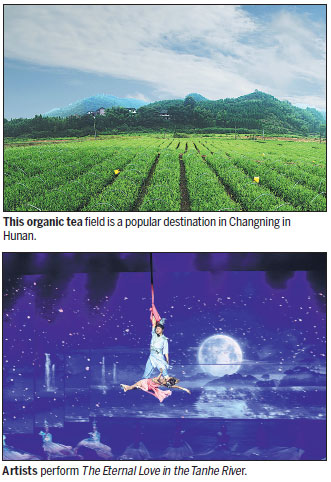Farming traditions draw tourists, lift area out of poverty
Updated: 2017-11-29 06:02
By Yuan Shenggao(HK Edition)
|
|||||||
A traditional festival that showcases the culture of Goulanyao village in Hunan province has boosted the local economy by drawing tourists to the area.

Known in English as a mud wash spree, the festival is a farming celebration created by the Yao ethnic group through their long history of agriculture. It falls on the 13th day of lunar May, according to the Chinese lunar calendar. Every year after the spring plowing season, Yao people take a mud bath to show their gratitude and anticipation for the harvest.
Farmers in the village put on performances featuring local customs, such as dragon and lion dances, playing the suona and singing songs, attracting many tourists.
"With villagers working in the field during the day and performing at night, the festival has become a crucial part of my life," said Ouyang Xuzhen, former Party chief of the Goulanyao village.
Ouyang has become the principal of the folk performance team and his family have all participated in the performance.
In 2016, Goulanyao village set up a cooperative for folklore shows, inviting experts to create programs with Yao ethnic features.
As part of the festival, the mud washing takes place every Saturday and during holidays, with some performances on weekdays.
This year, a Hunan satellite TV reality show, called Up Idol in English, visited the village to capture the locals' performances.
Song Yu, Party chief of the Goulanyao village, said: "The festival has become a brand of our village, attracting tens of thousands of tourists to experience it every month."
According to Song, shows were fully booked during the national holiday this year, transforming the previously poor village into a famous site.
The festival brings in total revenue of more than 300,000 yuan ($45,630) for local residents every year.
It creates jobs for villagers by developing rural tourism, such as entertainment, accommodation and tour bus services.
"Taking the opportunity of the tourism development in my hometown, I decided to come back and start a business," said He Guifei, an owner of a specialty store.
"During the national holiday, we can earn 300 yuan a day by selling handmade local food, which was impossible in the past," a local elderly person said.
Huang Danping, an owner of a local restaurant, said that the business has brought in a total revenue of 500,000 yuan since it opened in 2016.
To date, there have been 364 village families making money through rural tourism and 153 families have rid themselves of poverty.
The Goulanyao committee and branch of the Communist Party of China has set up a company to develop tourism based on local resources. Villagers have taken a stake in the company by supplying their land and housing.
From January to August this year, tourism increased villagers' per capita income by 2,600 yuan. The industry has helped 584 poor individuals to lift themselves out of poverty in the last two years.

(HK Edition 11/29/2017 page1)